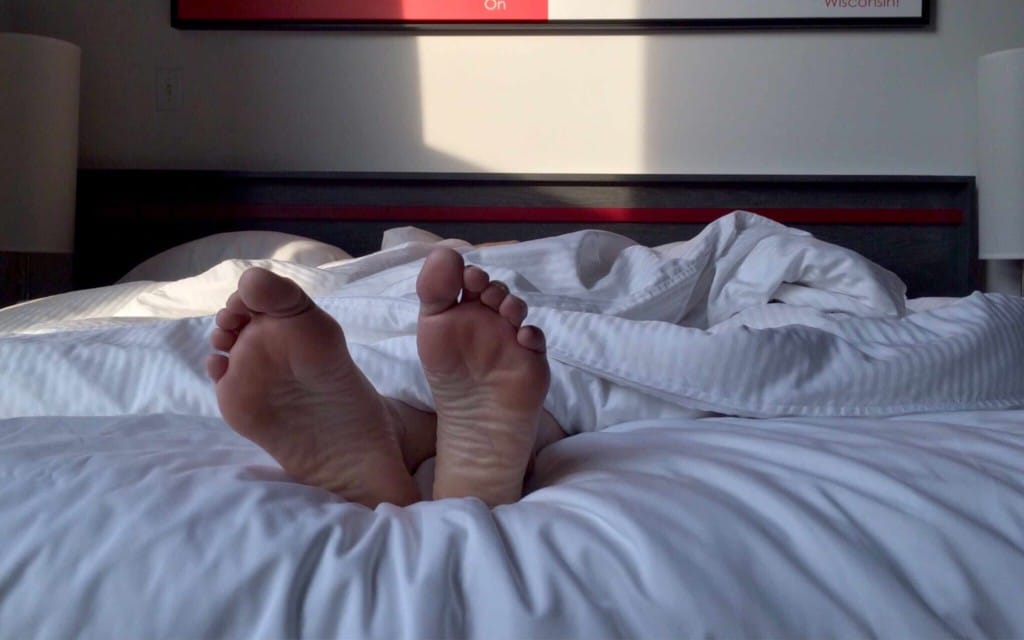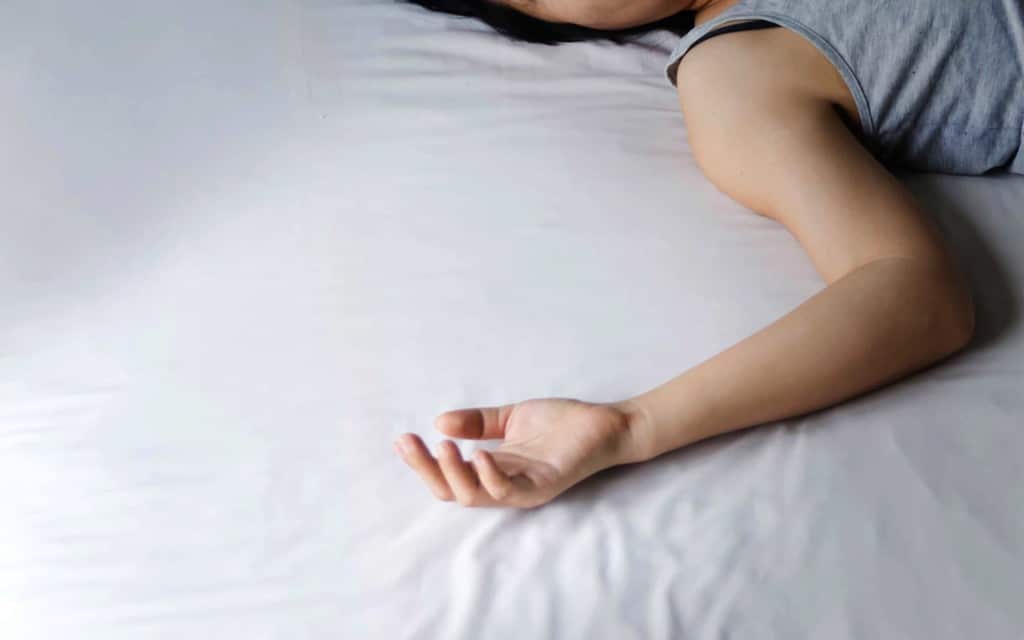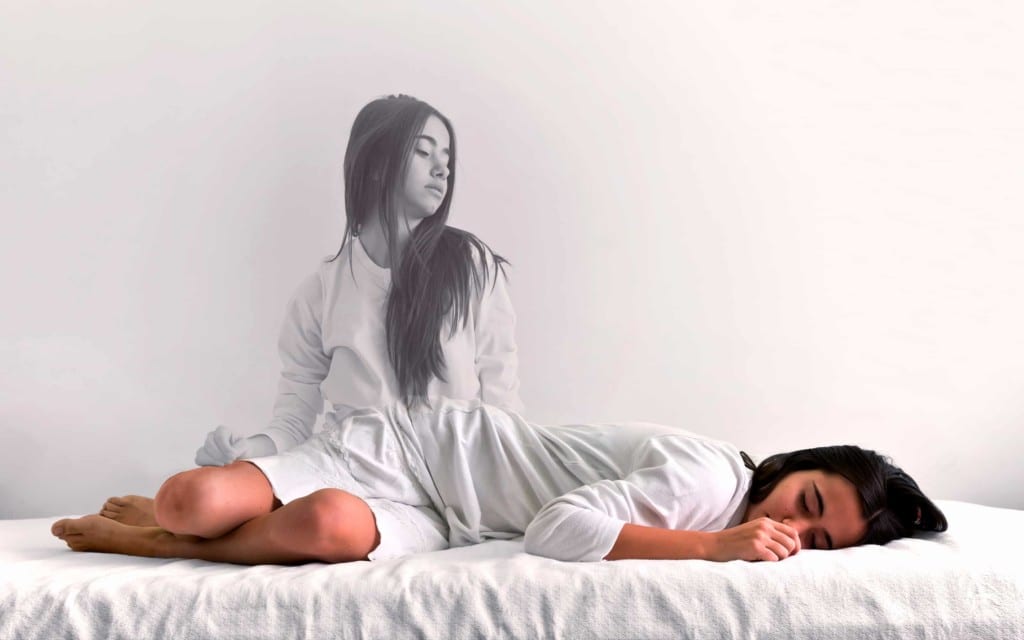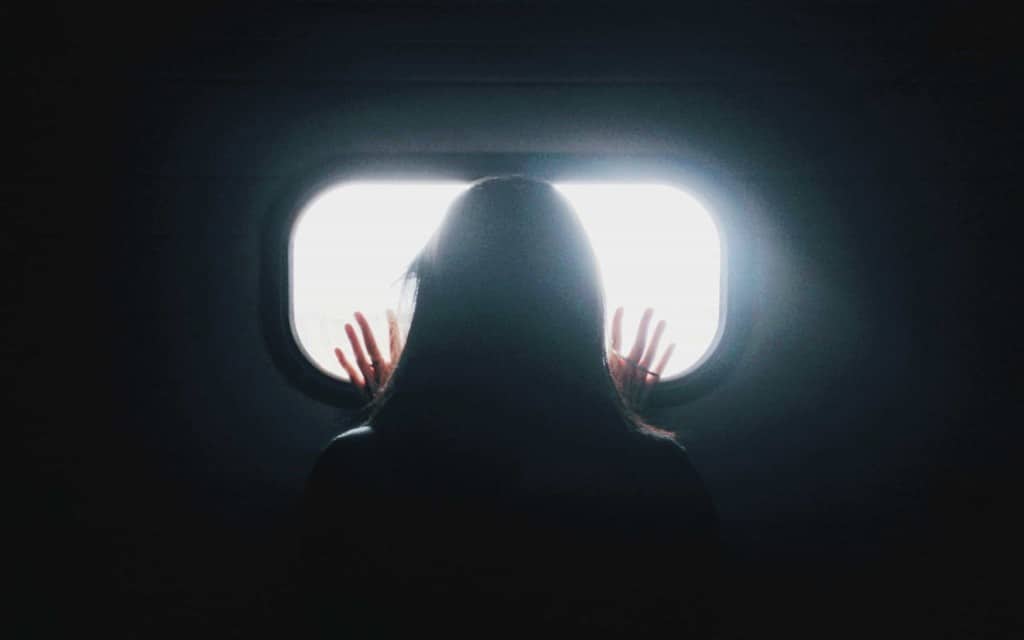Imagine this.
You’re snuggled up in your nice cosy bed, enjoying a night of restful sleep.
Suddenly, you wake up. Your eyes pop open, and your senses are on high alert. However, although you can see your bedroom and sense the atmosphere around you, you’re unable to move.
That’s sleep paralysis, and it’s a terrifying experience.
As horrifying as sleep paralysis might be for the people who experience it, we’re here to put your mind at rest.
This condition isn’t as dangerous as it seems. It’s just a sign that your mind is waking up before the rest of your body.
After all, during the deeper phases of sleep, your muscles enter a state that’s so relaxed, it’s impossible for you to control your limbs as usual.
If you wake up during one of these stages, that’s when sleep paralysis symptoms take place.
According to the latest research, around 8% of people will experience the sensation of waking up and not being able to move at some point in their lives.
However, this number jumps up to around 32% of all people with mental disorders, and 35% for people with a panic or anxiety disorder.
So, what causes sleep paralysis? Why is it so terrifying, and what can do you do protect yourself against it?

The definition of sleep paralysis: A waking nightmare
If the idea of waking up and not being able to move wasn’t frightening enough, many people refer to sleep paralysis as “waking up dead.”
Don’t worry — it’s not as bad as it sounds.
The definition of sleep paralysis is: “A condition when you’re temporarily paralysed after falling asleep.”
Because you can’t move or speak, it feels as though you have no control over your body. You’re just a spirit looking out from behind a stoic shell.
While that sounds like the stuff of nightmares, sleep paralysis isn’t technically the same as being asleep and having a bad dream.
However, you’re not completely awake either.
You’re stuck in the state between wake and sleep. Your body is still flooded with the chemicals intended to keep you paralysed, when you’re getting your sleep.
The good news?
While sleep paralysis symptoms are creepy — they’re not dangerous. No-one has ever died from sleep paralysis (that we know of).
So, if it’s not harmful, why is sleep paralysis so scary?
Well, one of the most common symptoms of sleep paralysis is hallucinations. Your mind is hyper-aware during this state between waking and sleep.
Because of this it will often attempt to fill in the blanks with visions and sensations that commonly happen during a nightmare.
Your brain is panicking, so it gives you a reason to be scared. Some people report seeing disturbing or ghostly figures hovering around their bedside — all while they’re unable to move.
Obviously, being stuck in a room with demons, ghosts, and other spectres is sure to fill you with fear.
The key to overcoming the symptoms of sleep paralysis, is understanding what causes it, and how you can reduce your risk factors.

Sleep paralysis symptoms: What to look out for
Before we explore the common causes of sleep paralysis, let’s look at the signs you might encounter if you’re unfortunate enough to have this experience for yourself.
Sleep paralysis isn’t a new concept. Waking up and not being able to move is an issue that goes back to the 19th century.
Philosophers and theologists wrote about what they thought were real encounters with demons and ghosts.
The main symptoms of sleep paralysis is an inability to talk or move for a brief period. Usually, this experience won’t last for long. However, during moments of fear, it can feel as though you’re stuck in limbo for eternity.
The state of paralysis often happens during the state between sleeping and wakefulness, when your mind is just beginning to wake up. Your brain will be fully conscious, but your muscles are still waking up.
The reason that people dread the sleep paralysis nightmare is that it often comes with horrible hallucinations.
According to research into the definition of sleep paralysis, these hallucinations fall into three distinct categories:
- A sensed presence: You might not see anything, but you’ll feel something evil or dangerous hovering around you, which raises your feelings of anxiety and fear.
- Incubus hallucinations: This involves feeling a sensation of pressure against your chest or abdomen. You might even think someone is trying to suffocate you.
- Vestibular-motor hallucinations: This is what happens when you think you’re floating, flying, or moving. You might have an out-of-body experience which makes it seem as though you’re looking down on your body from above.
Among these different kinds of hallucinations, the first option—the sensed presence—is the most common among sleep paralysis symptoms.
If you have particularly high sleep paralysis anxiety and vivid imagination, your sense of fear might be accompanied by shadowy images and figures in your room.
However, not everyone who has a hallucination during sleep paralysis will have visions.
Why does sleep paralysis happen?
So, what causes sleep paralysis? Why do we have to experience this horrible event?
Well, scientists aren’t entirely sure. According to one study published by the Journal of Sleep Research, the condition usually happens soon after you fall asleep or just before you wake up.
This means you’re more likely to experience this condition during the stages of sleep when your muscles are relaxed, but your mind is still very active.
Some experts believe that the causes of sleep paralysis are linked to something called REM atonia.
While REM is the stage of your sleep cycle associated with dreaming, atonia is a lack of muscle tension.
REM atonia is crucial for restful sleep. It stops you from taking action during your dreams and acting out whatever you’re dreaming about.
Remember, as you fall asleep each night, your brain tells your body to do things (like run away from a threat or jump off a building to fly around town).
However, because your electrical nerve impulses are turned off for the night, you don’t do anything.
The problems happen when you wake up during REM atonia periods — even for just a few seconds.
When you wake up, and your mind is active, but your body is paralysed, the natural response is chest-tightening fear.
Unfortunately, because you’re still in borderline sleep state, your mind responds to that fear by creating a reason for your terror. This could include a vivid hallucination.

The common causes of sleep paralysis
While the underlying reason may be REM atonia, there are other things that increase your risk of suffering from sleep paralysis.
Experts call these “sleep paralysis risk factors.”
Although research into these risk factors is still ongoing, scientists believe that people are more likely to experience frequent sleep paralysis if they have a genetic history of the condition.
If your parents once told you about waking up and not being able to move, then you may encounter the same event at some point in your life.
So, what else triggers sleep paralysis?
Well, a history of trauma could be a factor too. For most, the idea of sleep paralysis is enough to fill most people with anxiety.
Scientists are beginning to ask, “can anxiety cause sleep paralysis” too. Research indicates that higher feelings of stress and worry may increase your risk of experiencing this condition.
Psychiatric disorders, poor physical health, and even insomnia can all ramp up your risk factors according to a 2018 review.
The severity and frequency of episodes can also be linked to symptoms of anxiety. Other common triggers include:
- Sleeping on your back.
- Narcolepsy.
- Irregular sleeping patterns.
- Exposure to certain medications.
- Substance abuse.
While the causes of sleep paralysis are vast and varied, there’s, unfortunately, no set treatment for this condition.
Doctors can generally direct patients diagnosed with sleep paralysis to improve their sleep hygiene strategy. The patient is advised to set out a more active and regular daily routine.
In very severe cases, you might also be given a low dose of antidepressant or anti-anxiety medication. This might reduce some of the fearful experiences that can lead to sleep paralysis symptoms.

Can you die from sleep paralysis?
The sheer terror that people experience when going through sleep paralysis symptoms has led to some rather pressing questions about the condition.
If you’ve ever encountered the state between wake and sleep before, then you may have asked yourself the following:
“Can you die from sleep paralysis?” The simple answer to that question is no.
On its own, sleep paralysis isn’t dangerous at all. As horrifying as it might be to wake up feeling trapped, there’s nothing sleep paralysis will do to your body to increase your risk of illness or death.
However, it’s worth noting that the symptoms of sleep paralysis may be an indicator you’re experiencing other underlying conditions that need checking out.
If you’re dealing with frequent sleep paralysis problems, it’s a good idea to go and see a doctor.
Other reasons for sleep paralysis
Sometimes, cases of sleep paralysis may be a sign you’re suffering from narcolepsy — a problem that causes periods of daytime sleepiness.
Episodes of sleep paralysis can also happen to people who already have other sleeping disorders. This could be recurrent nightmares, sleep apnea, and nighttime muscle control issues.
In people with traumatic histories, sleep paralysis symptoms could be an indicator you’re experiencing post-traumatic stress disorder.
Patients who have been diagnosed with PTSD shows significantly higher rates of sleep paralysis compared with patients without PTSD. Sleep paralysis and anxiety are very closely connected issues.
If your doctor is worried about the reasons for your sleep paralysis, or your symptoms are frequent and severe, they may also prescribe you a medication for depression.
Usually, pills are used over a very short-term period to help with sleep paralysis. The type of drug your doctor will prescribe is often a tricyclic antidepressant or an SSRI.
These medicines help to prevent hallucinations and reduce the risk of depression and anxiety leading to sleep disorders.
If you have rare sleep paralysis episodes, you might not have seen a sleep professional. The best thing you can in this case,
Sleep paralysis is mostly a sign you’re suffering from sleep deprivation. Your body is having a hard time moving through your sleep cycles in a normal manner.

How to cope with frequent sleep paralysis issues
While it’s challenging to stop sleep paralysis from happening altogether, there are things you can do to reduce your risk.
For instance, most experts will recommend focusing on the fundamentals of achieving healthier sleeping patterns.
You’ll need to maintain a regular sleep routine (even on a weekend). You should avoid any stimulants that will keep you up at night. Eat well and have regular meals.
It’s also a good idea to seek out a therapist, if you have any issues with your mental health. Anxiety and depression are common sleep paralysis risk factors.
If you can get to the bottom of the things that are causing your fears and worries in your waking life, then you’ll have less frequent sleep paralysis.
If you do encounter the experience of waking up and not being able to move — the most essential thing that you can do is keep calm.
Ultimately, prevention is better than cure when it comes to sleep paralysis symptoms.
However, if you wake up in the middle of the night and you’re already in the throes of a paralysis session, you can attempt to cut the experience short by:
- Relaxing through the paralysis: Recognise that you’re just experiencing a common sleeping experience and you’re not in any danger.
- Gently encourage movement: Prompt your body and muscles to wake up by focusing on blinking, looking around the room, and gently attempting to wiggle your fingers and toes.
- Focus on breathing slowly and deeply: Your breathing may feel restricted during a sleep paralysis session. Remember that you can still breathe and you’re going to be fine. Inhale as deeply as you can, and exhale slowly.
If you can, try to focus on positive thoughts rather than allowing yourself to fall completely into the state of fear. It will be easier to manage, if you experience paralysis and lucid dreaming regularly.
Sleep paralysis facts: Overcoming the sleep paralysis nightmare
Sleep paralysis is a frightening and often shocking experience for those who encounter it. However, it’s not dangerous, and it certainly isn’t deadly.
The more you can remind yourself that you’re just in a different stage of sleep, the less stressed you’re likely to feel.
Here are a few facts to keep in mind as you learn about sleep paralysis and its symptoms:
It can happen to anyone
We mentioned what triggers sleep paralysis above, and the risk factors that make you more likely to have this condition.
However, it’s worth noting that sleep paralysis symptoms can affect just about anyone. Usually, the events happen during the teenage and early adult years, but they can continue later in life too.
Additionally, gender has no effect on the likelihood of having sleep paralysis.
It happens during specific times in the sleeping cycle
Sleep paralysis will always occur when you’re in the borderline state between wake and sleep. While researchers aren’t totally sure why this is the case, they do know that you need to be in a muscle atonic state, when you’re unable to control your body.
Lack of sleep is one of the most common causes of sleep paralysis
If you needed another reason to make sure that you get plenty of rest each night, it’s worth noting that sleep paralysis is more likely when you’re sleep-deprived.
The best thing you can do to avoid this experience is make sure that you stick to your sleeping routine and get plenty of rest.
Most people will need between 7 and 9 hours of sleep every night.
It could be a sign of another condition
Remember that sleep paralysis isn’t dangerous by itself, but it could be a sign that there’s something else going on with your mind or body.
Sleep paralysis is frequently caused by PTSD, depression or anxiety.
Additionally, it can sometimes be a sign that you’re suffering from sleep apnoea or narcolepsy.
If you ever encounter sleep paralysis for yourself, the best thing you can do is get through the session is remaining as calm as you can.
Once you wake up properly, you can arrange an appointment with your doctor to discuss why you have been a victim of waking up and not being able to move.

Managing the state between wake and sleep
The good news?
Ultimately, sleep paralysis isn’t nearly as terrifying as it seems.
The sleep paralysis nightmare becomes increasingly less likely as you get older. Usually, this condition will disappear by itself over time, with no need for treatment at all.
Although you’re likely to feel scared when you wake up feeling trapped in your own body, you’ll get through the issue faster than you’d think.
Most people who suffer from sleep paralysis also feel exhausted after an episode. This means that you may find that it’s a lot easier to get back to sleep or fall asleep the next night.
The best thing you can do to reduce your risk of sleep paralysis is to ensure that you’re getting plenty of rest.
Work on improving your sleep hygiene and stick to a regular schedule.
Remember, if you’re worried about frequent sleep paralysis, contacting your doctor can be an excellent opportunity to find out whether any underlying conditions are contributing to your disorder.
Your GP may refer you to a sleep clinic if you’re experiencing severe symptoms, or you have other problems with your sleep.
Siestio. Sleep Matters.
Medical disclaimer
You must not rely on the information provided on our website as an alternative to medical advice from your doctor or other healthcare professionals. For more information read our full disclaimer here.







